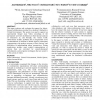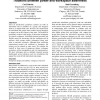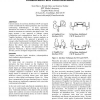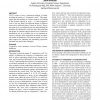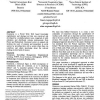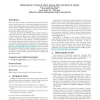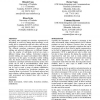127
Voted
CSCW
1998
ACM
15 years 6 months ago
1998
ACM
This paper explores and evaluates the support for objectfocused collaboration provided by a desktop Collaborative Virtual Environment. The system was used to support an experiment...
120
Voted
CSCW
1998
ACM
15 years 6 months ago
1998
ACM
Users of synchronous groupware systems act both as individuals and as members of a group, and designers must try to support both roles. However, the requirements of individuals an...
125
Voted
CSCW
1998
ACM
15 years 6 months ago
1998
ACM
Current systems for real-time distributed CSCW are largely rooted in traditional GUI-based groupware and voice/video conferencing methodologies. In these approaches, interactions ...
127
Voted
CSCW
1998
ACM
15 years 6 months ago
1998
ACM
The Artefact framework supports collaborative applications using standard browsers, a lightweight general-purpose Java applet, and HTML representations of objects and actions. We ...
121
Voted
CSCW
1998
ACM
15 years 6 months ago
1998
ACM
Meme Tags are part of a body of research on GroupWear: a wearable technology that supports people in the formative stages of cooperative work. Conference participants wear Meme Ta...
117
click to vote
CSCW
1998
ACM
15 years 6 months ago
1998
ACM
CSCW seems to have a persistent problem of understanding the nature of “cooperative work”. This paper argues that this problem is a direct result of not looking at the dynamic...
93
Voted
CSCW
1998
ACM
15 years 6 months ago
1998
ACM
The term organizational memory is due for an overhaul. Memory appears to be everywhere in organizations; yet, the term has been limited to a few uses. In this paper we examine wha...
122
Voted
GROUP
1999
ACM
15 years 6 months ago
1999
ACM
Oxymoron is a World Wide Web based knowledge capitalization and sharing tool that was conceived and developed by a multidisciplinary team, comprised of adult education and distrib...
114
click to vote
WWW
2010
ACM
15 years 6 months ago
2010
ACM
The social sciences strive to understand the political, social, and cultural world around us, but have been impaired by limited access to the quantitative data sources enjoyed by ...
105
Voted
CSCW
2000
ACM
15 years 7 months ago
2000
ACM
By sharing data regarding the sensations experienced by individuals, as well as by sharing their knowledge, we are readily able to communicate with each other, and there are possi...
